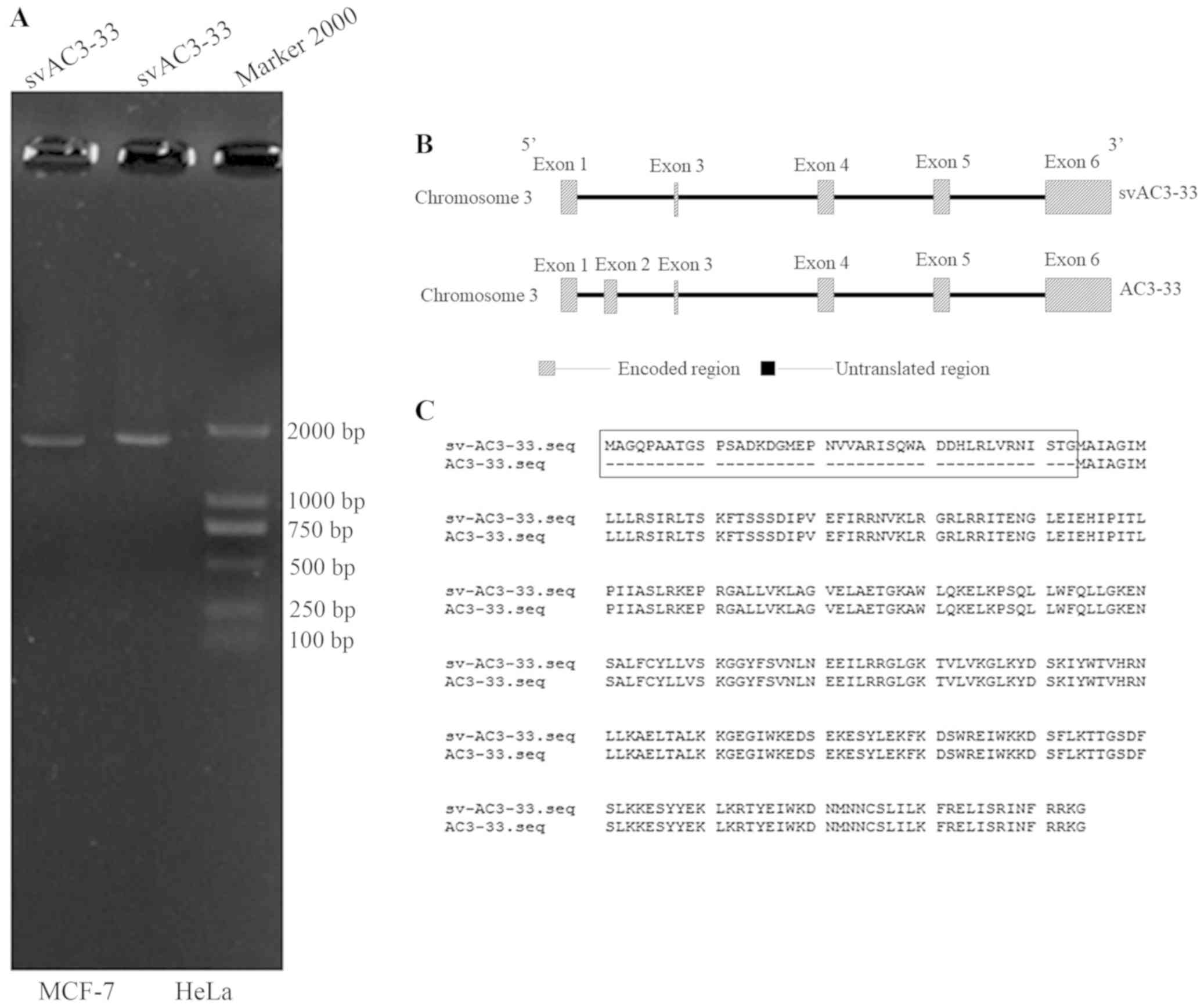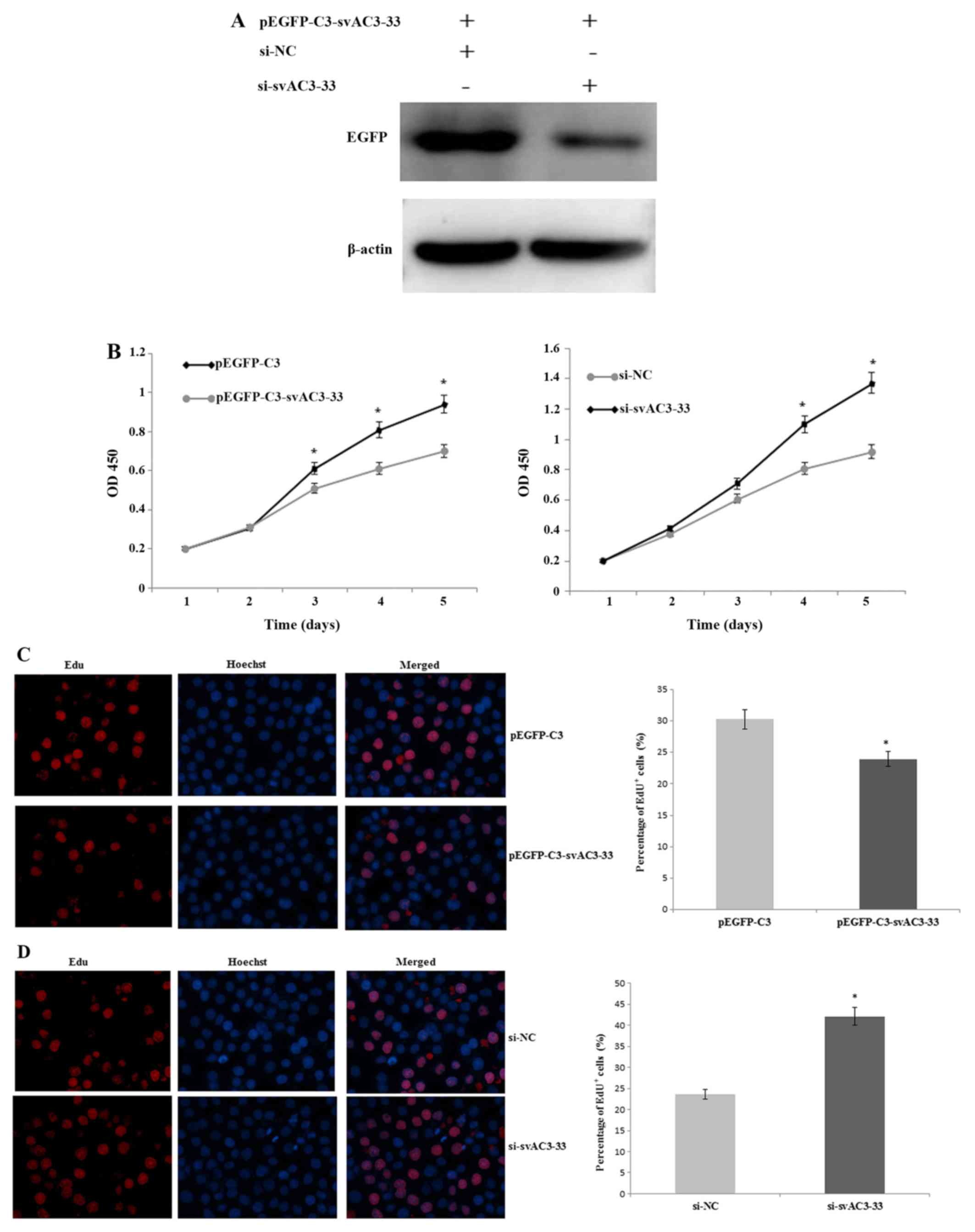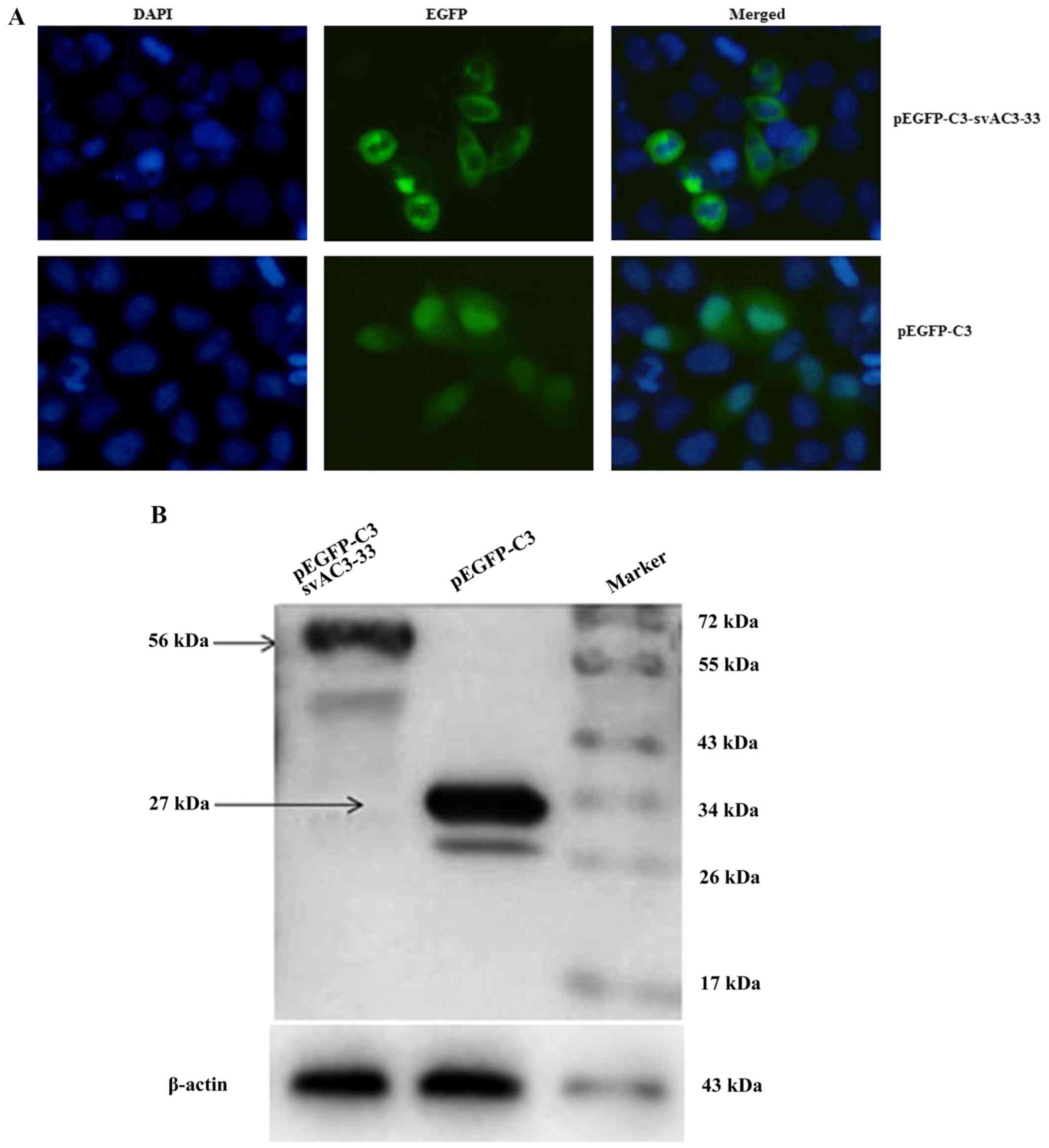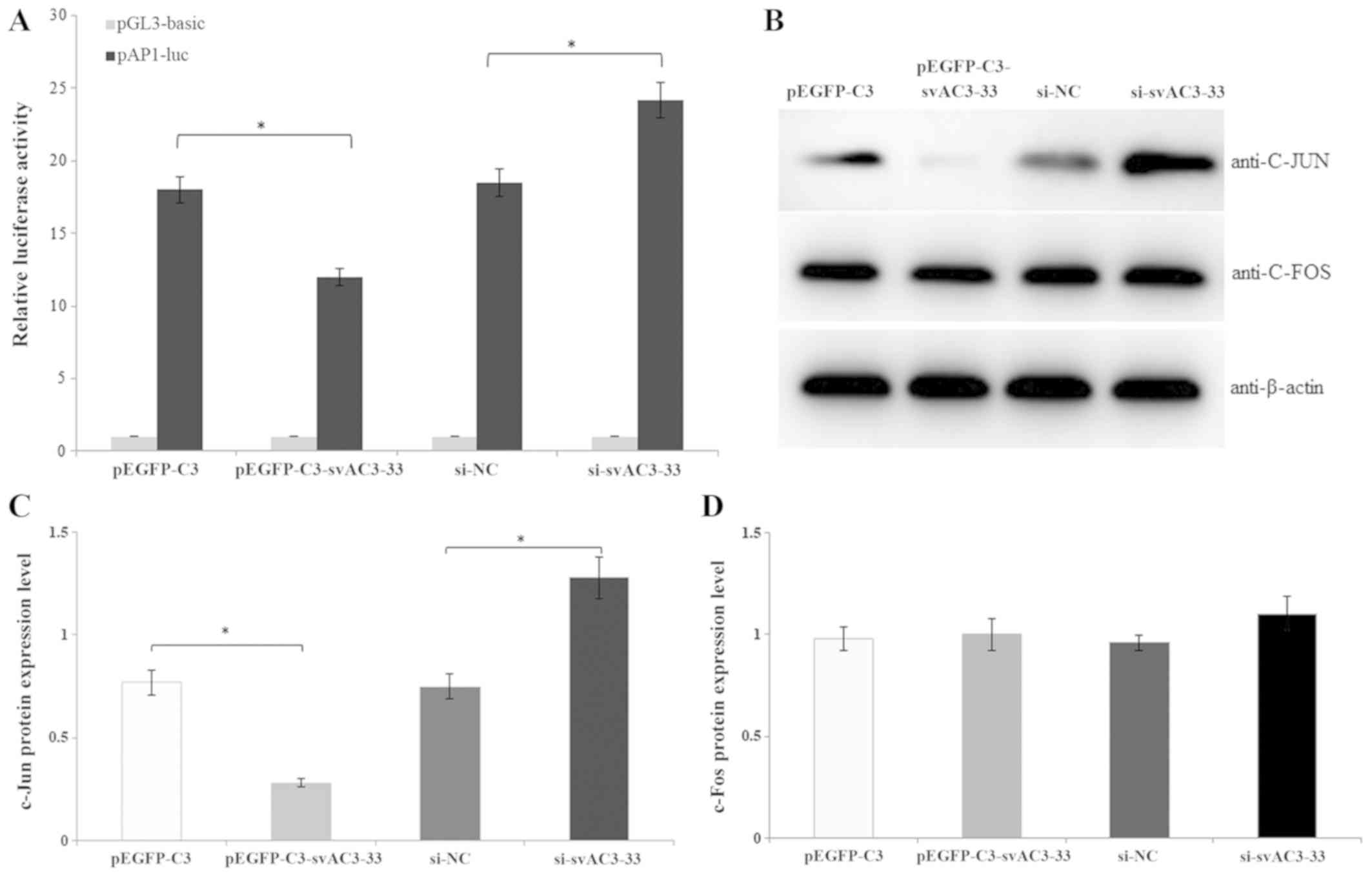|
1
|
Zhang X, Ma X, Xue Y, Meng L, He B, He S,
Zhao J, Wang Y and Yang W: Prokaryotic expression and
characterization of human AC3-33 protein. Front Biosci (Elite Ed).
2:1134–1142. 2010. View
Article : Google Scholar : PubMed/NCBI
|
|
2
|
Liu P, Deng WW, Gao P, Lu Y, Sun B, Li M,
Zhao J, Shi TP and Zhang XJ: Molecular cloning and preliminary
function study of a novel human gene AC3-33 related to suppress
AP-1 activity. Yi Chuan. 30:575–582. 2008.(In Chinese). View Article : Google Scholar : PubMed/NCBI
|
|
3
|
Hao D, Gao P, Liu P, Zhao J, Wang Y, Yang
W, Lu Y, Shi T and Zhang X: AC3-33, a novel secretory protein,
inhibits Elk1 transcriptional activity via ERK pathway. Mol Biol
Rep. 38:1375–1382. 2011. View Article : Google Scholar : PubMed/NCBI
|
|
4
|
Wang ET, Sandberg R, Luo S, Khrebtukova I,
Zhang L, Mayr C, Kingsmore SF, Schroth GP and Burge CB: Alternative
isoform regulation in human tissue transcriptomes. Nature.
456:470–476. 2008. View Article : Google Scholar : PubMed/NCBI
|
|
5
|
Matlin AJ, Clark F and Smith CW:
Understanding alternative splicing: Towards a cellular code. Nat
Rev Mol Cell Bio. 6:386–398. 2005. View
Article : Google Scholar
|
|
6
|
Wang P, Yu P, Gao P, Shi T and Ma D:
Discovery of novel human transcript variants by analysis of
intronic single-block EST with polyadenylation site. BMC Genomics.
10:5182009. View Article : Google Scholar : PubMed/NCBI
|
|
7
|
Valachovicova T, Slivova V, Bergman H,
Shuherk J and Sliva D: Soy isoflavones suppress invasiveness of
breast cancer cells by the inhibition of NF-kappaB/AP-1-dependent
and -independent pathways. Int J Oncol. 25:1389–1395.
2004.PubMed/NCBI
|
|
8
|
Zhou Y, Yau C, Gray JW, Chew K, Dairkee
SH, Moore DH, Eppenberger U, Eppenberger-Castori S and Benz CC:
Enhanced NF kappaB and AP-1 transcriptional activity associated
with antiestrogen resistant breast cancer. BMC Cancer. 7:592007.
View Article : Google Scholar : PubMed/NCBI
|
|
9
|
Liu Q, Song YJ, Meng LJ, Hu F, Gou LX, Jia
CH, Tang HM, Wang WJ, Li M, Zhang XJ and Jia MC: Role of LM23 in
cell proliferation and apoptosis and its expression during the
testis development. Asian J Androl. 15:539–544. 2013. View Article : Google Scholar : PubMed/NCBI
|
|
10
|
Guo L, Chen C, Shi M, Wang F, Chen X, Diao
D, Hu M, Yu M, Qian L and Guo N: Stat3-coordinated
Lin-28-let-7-HMGA2 and miR-200-ZEB1 circuits initiate and maintain
oncostatin M-driven epithelial-mesenchymal transition. Oncogene.
32:5272–5282. 2013. View Article : Google Scholar : PubMed/NCBI
|
|
11
|
Liu Y, Ludes-Meyers J, Zhang Y,
Munoz-Medellin D, Kim HT, Lu C, Ge G, Schiff R, Hilsenbeck SG,
Osborne CK and Brown PH: Inhibition of AP-1 transcription factor
causes blockade of multiple signal transduction pathways and
inhibits breast cancer growth. Oncogene. 21:7680–7689. 2002.
View Article : Google Scholar : PubMed/NCBI
|
|
12
|
Huang J, Shi T, Ma T, Zhang Y, Ma X, Lu Y,
Song Q, Liu W, Ma D and Qiu X: CCDC134, a novel secretory protein,
inhibits activation of ERK and JNK, but not p38 MAPK. Cell Mol Life
Sci. 65:338–349. 2008. View Article : Google Scholar : PubMed/NCBI
|
|
13
|
Byun HJ, Hong IK, Kim E, Jin YJ, Jeoung
DI, Hahn JH, Kim YM, Park SH and Lee H: A splice variant of CD99
increases motility and MMP-9 expression of human breast cancer
cells through the AKT-, ERK- and JNK-dependent AP-1 activation
signaling pathways. J Biol Chem. 281:34833–473. 2006. View Article : Google Scholar : PubMed/NCBI
|
|
14
|
Sunters A, Madureira PA, Pomeranz KM,
Aubert M, Brosens JJ, Cook SJ, Burgering BM, Coombes RC and Lam EW:
Paclitaxel-induced nuclear translocation of FOXO3a in breast cancer
cells is mediated by c-Jun NH2-terminal kinase and Akt. Cancer Res.
66:212–220. 2006. View Article : Google Scholar : PubMed/NCBI
|
|
15
|
Philips A, Chalbos D and Rochefort H:
Estradiol increases and anti-estrogens antagonize the growth
factor-induced activator protein-1 activity in MCF7 breast cancer
cells without affecting c-fosand c-jun synthesis. J Biol Chem.
268:14103–14108. 1993.PubMed/NCBI
|
|
16
|
Hu F, Meng X, Tong Q, Liang L, Xiang R,
Zhu T and Yang S: BMP-6 inhibits cell proliferation by targeting
microRNA-192 in breast cancer. Biochim Biophys Acta.
1832:2379–2390. 2013. View Article : Google Scholar : PubMed/NCBI
|
|
17
|
Zang S, Chen F, Dai J, Guo D, Tse W, Qu X,
Ma D and Ji C: RNAi-mediated knockdown of Notch-1 leads to cell
growth inhibition and enhanced chemosensitivity in human breast
cancer. Oncol Rep. 23:893–899. 2010.PubMed/NCBI
|
|
18
|
Sun B, Nishihira J, Yoshiki T, Kondo M,
Sato Y, Sasaki F and Todo S: Macrophage migration inhibitory factor
promotes tumor invasion and metastasis via the Rho-dependent
pathway. Clin Cancer Res. 11:1050–1058. 2005.PubMed/NCBI
|
|
19
|
Das R, Mahabeleshwar GH and Kundu GC:
Osteopontin induces AP-1-mediated secretion of urokinase-type
plasminogen activator through c-Src-dependent epidermal growth
factor receptor transactivation in breast cancer cells. J Biol
Chem. 279:11051–11064. 2004. View Article : Google Scholar : PubMed/NCBI
|
|
20
|
Wang P, Sun B, Hao D, Zhang X, Shi T and
Ma D: Human TMEM174 that is highly expressed in kidney tissue
activates AP-1 and promotes cell proliferation. Biochem Biophys Res
Commun. 394:993–999. 2010. View Article : Google Scholar : PubMed/NCBI
|
|
21
|
Livak KJ and Schmittgen TD: Analysis of
relative gene expression data using real-time quantitative PCR and
the 2(-Delta Delta C(T)) method. Methods. 25:402–408. 2001.
View Article : Google Scholar : PubMed/NCBI
|
|
22
|
Lewis BP, Green RE and Brenner SE:
Evidence for the widespread coupling of alternative splicing and
nonsense-mediated mRNA decay in humans. Proc Natl Acad Sci USA.
100:189–192. 2003. View Article : Google Scholar : PubMed/NCBI
|
|
23
|
Modrek B and Lee C: A genomic view of
alternative splicing. Nat Genet. 30:13–19. 2002. View Article : Google Scholar : PubMed/NCBI
|
|
24
|
Graveley BR: Alternative splicing:
Increasing diversity in the proteomic world. Trends Genet.
17:100–117. 2001. View Article : Google Scholar : PubMed/NCBI
|
|
25
|
Brett D, Hanke J, Lehmann G, Haase S,
Delbrück S, Krueger S, Reich J and Bork P: EST comparison indicates
38% of human mRNAs contain possible alternative splice forms. FEBS
Lett. 474:83–86. 2000. View Article : Google Scholar : PubMed/NCBI
|
|
26
|
Ladd AN and Cooper TA: Finding signals
that regulate alternative splicing in the post-genomic era. Genome
Biol. 3:reviews00082002. View Article : Google Scholar : PubMed/NCBI
|
|
27
|
Zheng ZM: Regulation of alternative RNA
splicing by exon definition and exon sequences in viral and
mammalian gene expression. J Biomed Sci. 11:278–294. 2004.
View Article : Google Scholar : PubMed/NCBI
|
|
28
|
Unoki M, Shen JC, Zheng ZM and Harris CC:
Novel splice variants of ING4 and their possible roles in the
regulation of cell growth and motility. J Biol Chem.
281:34677–34686. 2006. View Article : Google Scholar : PubMed/NCBI
|
|
29
|
Liao XH, Lu DL, Wang N, Liu LY, Wang Y, Li
YQ, Yan TB, Sun XG, Hu P and Zhang TC: Estrogen receptor a mediates
proliferation of breast cancer MCF-7 cells via a
p21/PCNA/E2F1-dependent pathway. FEBS J. 281:927–942. 2014.
View Article : Google Scholar : PubMed/NCBI
|
|
30
|
Al-Saran N, Subash-Babu P, Al-Nouri DM,
Alfawaz HA and Alshatwi AA: Zinc enhances CDKN2A, pRb1 expression
and regulates functional apoptosis via upregulation of p53 and p21
expression in human breast cancer MCF-7 cell. Environ Toxicol
Pharmacol. 47:19–27. 2016. View Article : Google Scholar : PubMed/NCBI
|
|
31
|
Wang L, Wang G, Yang D, Guo X, Xu Y, Feng
B and Kang J: Euphol arrests breast cancer cells at the G1 phase
through the modulation of cyclin D1, p21 and p27 expression. Mol
Med Rep. 8:1279–1285. 2013. View Article : Google Scholar : PubMed/NCBI
|
|
32
|
Lee MN, Jung EY, Kwun HJ, Jun HK, Yu DY,
Choi YH and Jang KL: Hepatitis C virus core protein represses the
p21 promoter through inhibition of a TGF-beta pathway. J Gen Virol.
83:2145–2151. 2002. View Article : Google Scholar : PubMed/NCBI
|
|
33
|
Stepniak E, Ricci R, Eferl R, Sumara G,
Sumara I, Rath M, Hui L and Wagner EF: c-Jun/AP-1 controls liver
regeneration by repressing p53/p21 and p38 MAPK activity. Genes
Dev. 20:2306–2314. 2006. View Article : Google Scholar : PubMed/NCBI
|
|
34
|
Gallo A, Cuozzo C, Esposito I, Maggiolini
M, Bonofiglio D, Vivacqua A, Garramone M, Weiss C, Bohmann D and
Musti AM: Menin uncouples Elk-1, JunD and c-Jun phosphorylation
from MAP kinase activation. Oncogene. 21:6434–6445. 2002.
View Article : Google Scholar : PubMed/NCBI
|


















